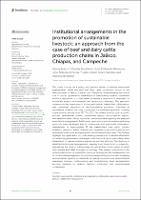Institutional arrangements in the promotion of sustainable livestock: an approach from the case of beef and dairy cattle production chains in Jalisco, Chiapas, and Campeche

View/
Date
04-04-2024Author
Avalos, Ileana
Sepulveda, Claudia
Betanzos, Juan Edduardo
Jimenes-Trujillo, Jose Antonio
Pérez-Sánches, Edwin
Escobedo, Adriana
Sustainable development goals
ODS 12 - Producción y consumo responsables
ODS 13 - Acción por el clima
Type
Artículo
Metadata
Show full item recordAbstract
This study focuses on a policy and practice review of existing institutional arrangements within the beef and dairy cattle production sectors in the Mexican states of Jalisco, Chiapas, and Campeche. Acknowledging the critical role of robust governance frameworks in transitioning towards sustainable livestock agriculture, a collaborative governance approach is employed to holistically address environmental and production challenges. This approach underscores the importance of active participation, stakeholder collaboration, and contextual adaptation in decision-making processes. Classified as explanatory research, the study is grounded in a qualitative approach, covering a synchronous period from 2017 to 2022. Secondary sources such as public policies, international climate commitment reports, sector-specific reports, and databases were utilized to provide context and data regarding the analyzed institutional arrangements. Additionally, semi-structured information-gathering protocols were developed and, in conjunction with participant observation, administered to approximately 30 key stakeholders from public, private, academic, research centers, international cooperation, and civil society sectors involved in institutional arrangements in the aforementioned states. The findings highlight the significance of collaborative governance as a valuable alternative for addressing governance challenges in the livestock sector, particularly when hierarchical or market-oriented approaches are less effective. The diversity of identified institutional arrangements, ranging from hierarchical to polyarchic, emphasizes the need to acknowledge the specificities of the context in which they operate and adapt strategies accordingly. This analysis contributes to the growing discussion on sustainable livestock farming and the fundamental role of institutional arrangements in promoting responsible practices and mitigating environmental impacts. As demands for natural resources and environmental awareness increase, understanding and strengthening these arrangements become essential to balance livestock production and environmental conservation.
Keywords
Delegation
Sede Central
Publisher
Frontiers
Is part of
Frontiers in Sustainable Food Systems
Status
openAccess
xmlui.dri2xhtml.METS-1.0.item-uri-link
https://doi.org/10.3389/fsufs.2024.1310507

